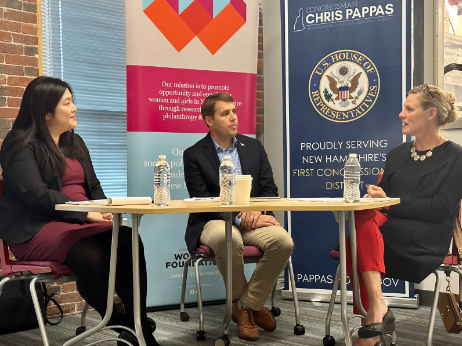Pappas Holds Discussion on Digital Privacy Rights & Abortion
On October 14, Congressman Chris Pappas (NH-01) hosted a discussion on the importance of digital privacy rights for women in the wake of the Dobbs decision that overturned Roe v. Wade. Pappas was joined by Tiffany Li, a UNH Law Adjunct Professor and privacy expert, and Tanna Clews, President and CEO of the New Hampshire Women’s Foundation. Pappas discussed his support for the My Body My Data Act and the bipartisan American Data Privacy and Protection Act, as well as his efforts to restore the protections provided by Roe v. Wade in Congress.

“In the wake of the Dobbs decision, we've seen a race to the bottom as states enact onerous laws targeting women and taking away their health care choices,” said Congressman Pappas. “In addition to protecting access to reproductive health care, I am also co-sponsoring the My Body My Data Act which would prevent personal health information from being shared, collected, or retained in a way that can be used against women. It’s essential that we stop the extreme political attacks on women’s health care and the privacy that all Americans deserve.”
“We are talking about privacy law, precedent that truly is at the heart of our fundamental rights. So it's not just the right to abortion that’s at risk, it's the right to gay marriage, it's the right to interracial marriage, it's the right to contraception, and how to plan your own family,” said Professor Li. “Codifying abortion rights is really important, but difficult to get done quickly, which is unfortunate. But there's another piece to this, which is technology. Now that abortion is criminalized in some states, that means that the data any individual puts into their phones, like a message saying, ‘I'm going to a clinic next Thursday,’ or maybe your directions from Google Maps, or even fertility tracking apps, could be collected and used against you. That’s why bills like the My Body My Data Act are really important to enshrine protections for individual privacy.”
“New Hampshire is the only state in New England that has not protected the right to abortion in state law. When women do not have access to full reproductive health care, it has multi-generational effects and impacts their economic security and labor force participation,” said Clews, President & CEO of the New Hampshire Women’s Foundation. “Women and people who can get pregnant should have access to birth control, abortion and the full spectrum of reproductive and gender-affirming health care. The Women's Foundation is committed to expanding access to reproductive healthcare and abortion services and eliminating barriers to care.”
